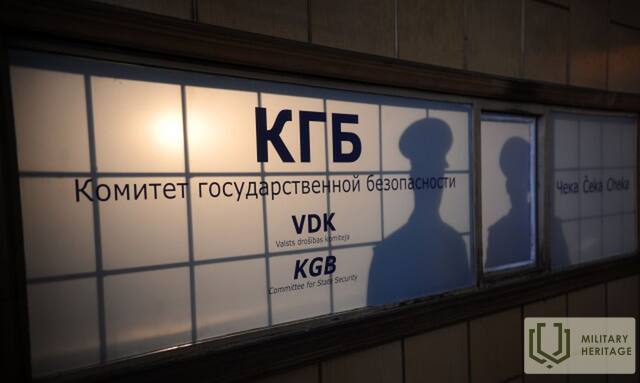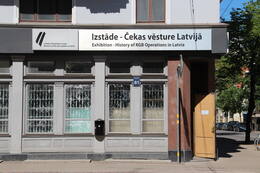Valstybės saugumo komitetas / KGB
IV Sovietų okupacija
Represinė institucija (veikė nuo 1954 m. balandžio 10 d. iki 1991 m. rugpjūčio 24 d.), atlikusi politinės policijos funkcijas, skirtas užtikrinti totalitarinę Latvijos komunistų partijos (LKP) valdžią, taip pat sovietinės politinės, ekonominės ir socialinės sistemos egzistavimą ir stabilumą Latvijoje.
KGB agentai, vadinami „čekistais“, kilęs iš rusiško santrumpos ВЧК (VChK), reiškiančios KGB pirmtaką, visos Rusijos nepaprastąją kovos su kontrrevoliucija ir sabotažu komisiją (rus. по борьбе с контрреволюцией и саботажем), veikusi 1917–1922 m.
Susijusi laiko juosta
Susijusios vietos
Paroda KGB pastate „KGB operacijų Latvijoje istorija“
Buvęs SSRS Valstybės saugumo komiteto (paprastai vadinamas Čeka) pastatas atviras lankytojams. Čia čekistai kalindavo, tardydavo ir žudydavo Latvijos piliečius, kuriuos okupacinis režimas laikė priešininkais. Taip pat eksponuojama Latvijos okupacijos muziejaus ekspozicija apie Čekos veiklą Latvijoje. Siūlomos ekskursijos po kalėjimo kameras, koridorius, rūsį ir kiemą. Namas pastatytas 1911 m. ir yra vienas gražiausių pastatų Rygoje. Liaudyje vadinamas „Kampiniu namu“, jis buvo baisiausias sovietinio okupacinio režimo simbolis Latvijoje ir vienas iš SSRS valdžios ramsčių. Čeka iš Kampinio namo veikė okupacijos metu nuo 1940 iki 1941 m., o vėliau nuo 1945 iki 1991 m. Dešimtys tūkstančių latvių nukentėjo nuo tiesioginio politinio persekiojimo. Kova su sovietų valdžios priešais tęsėsi ir po Antrojo pasaulinio karo. Čekos požiūris į savo veiklą šiek tiek pasikeitė po Stalino mirties. Fizinį kankinimą pakeitė psichologinis teroras. Dauguma Čekos agentų buvo latviai (52 %). Antra pagal dydį grupė buvo rusai – 23,7 %. 60,3 % agentų nebuvo Komunistų partijos nariai. 26,9 % agentų turėjo aukštąjį išsilavinimą. Sistema buvo sukurta taip, kad įtrauktų vietos gyventojus ir taip turėtų didesnę kontrolę visuomenėje. Personalo dokumentai ir tarnybos įrašai yra Rusijoje. Ši medžiaga nebuvo prieinama Latvijos valdžios institucijoms ir tyrėjams.
Susijusi istorija
Apie kampinį namą
Pasakotoja aprašo pirmuosius įspūdžius atvykus į Kampinį namą. Prisiminimai atskleidžia atšiaurias kalinių gyvenimo sąlygas.






